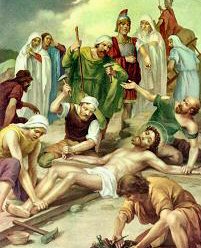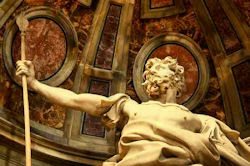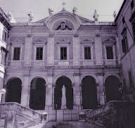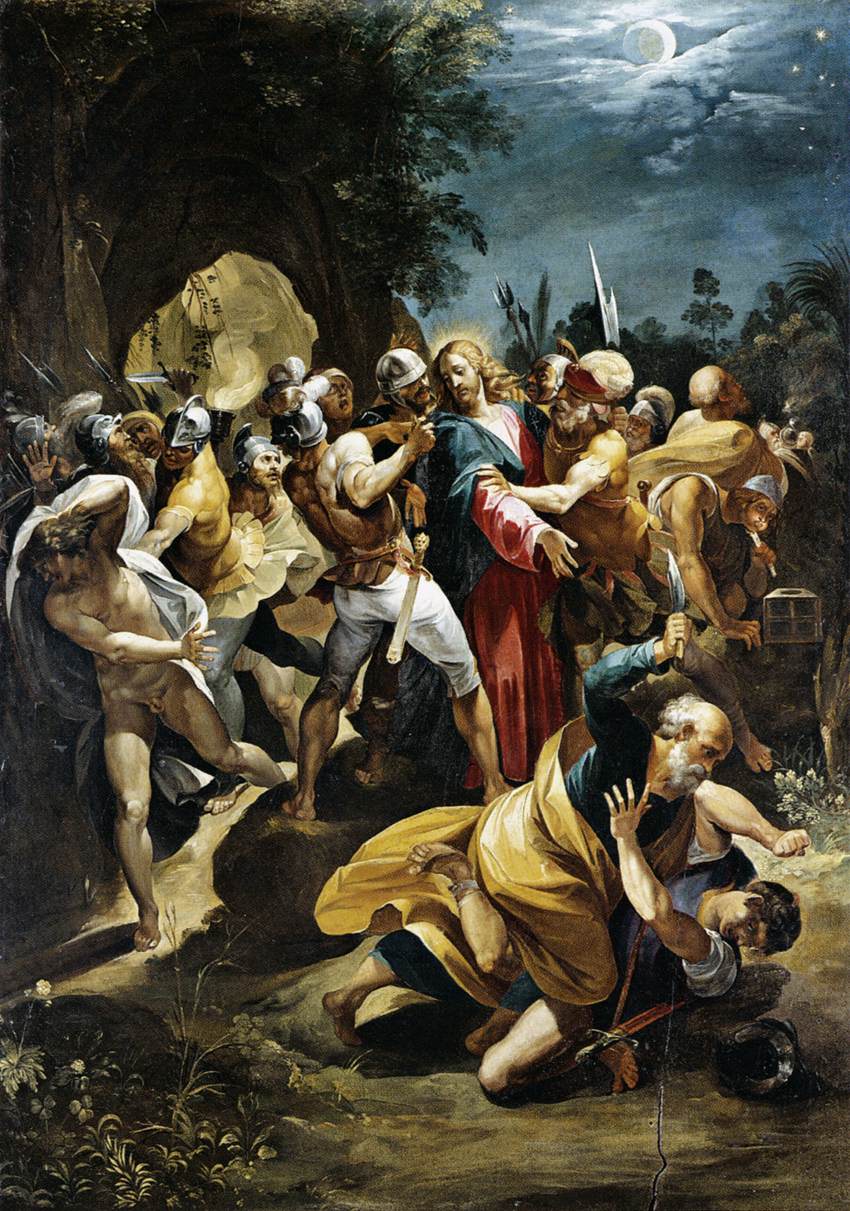1. After these things Jesus walked in Galilee: for he would not walk in Jewry, because the Jews sought to kill him.
2. Now the Jews' feast of tabernacles was at hand.
AUG. As the believer in Christ would have in time to, come to hide himself from persecution, that no guilt might attach to such concealment, the Head began with doing Himself, what He sanctioned in the member; After these things Jesus walked in Galilee: for he would not walk in Jewry, because the Jews sought to kill Him.
BEDE. The connection of this passage admits of much taking place in the interval previously. Judea and Galilee are divisions of the province of Palestine. Judea has its name from the tribe of Judah; but it embraces not only the territories of Judah, but of Benjamin, all of which were called Judea, because Judah was the royal tribe Galilee has its name, from the milky, i.e. white, color of its inhabitants; Galilee being Greek for milk.
AUG. It is not meant that our Lord could not walk among the Jews, and escape being killed; for He had this power, whenever He chose to show it: but He set the example of so doing, as an accommodation to our weakness. He had not lost His power, but He indulged our frailty.
CHRYS. That is to say, He displayed the attribute both of divinity and humanity. He fled from His persecutors as man, He remained and appeared amongst them as God; being really both.
THEOPHYL. He withdrew too now to Galilee, because the hour of His passion was not yet come; and He thought it useless to stay in the midst of His enemies, when the effect would only have been to irritate them the more. The time at which this happened is then given; Now the Jews; feast of tabernacles was at hand.
AUG. What the feast of tabernacles is, we read in the Scriptures. They used to make tents on the festival, like those in which they lived during their journey in the desert, after their departure from Egypt. They celebrated this feast in commemoration of the good things the Lord had done for them; though they were the very people who were about to slay the Lord. It is called the day of the feast, though it lasted many days.
CHRYS. It appears here, that a considerable time had passed since the last events. For when our Lord sat upon the mount, it was near the feast of the Passover and now it is the feast of tabernacles: so that in the five intermediate months the Evangelist has related nothing but the miracle of the loaves, and the conversation with those who ate of them. As our Lord was unceasingly working miracles, and holding disputes with people, the Evangelists could not relate all; but only aimed at giving those, in which complaint or opposition had followed on the part of the Jews as was as the case here.
10. But when his brethren were gone up, then went he also up to the feast, not openly, but as it were in secret.
THEOPHYL. Our Lord at first declares that He will not go up to the feast, (I go not up with you,) in order not to expose Himself to the rage of the Jews; and therefore we read, that, When He had said these words to them, He abode still in Galilee. Afterwards, however, He goes up; But when His brethren were gone up, then went He also up to the feast.
AUG. He went up, however, not to get temporary glory, but, to teach wholesome doctrine, and remind men of the eternal feast.
CHRYS. He goes up, not to suffer, but to teach. And He goes up secretly; because, though He could have gone openly, and kept the violence and impetuosity of the Jews in check, as He had often done before; yet to do this every time, would have disclosed His divinity; and he wished to establish the fact of His incarnation, and to teach us the way of life. And He went up privately too, to show us what we ought to do, who cannot check our persecutors. It is not said, however, in secret, but, as it were in secret; to show that it was done as a kind of economy. For had He done all things as God, how should we of this world know what to do, when we fell into danger?
ALCUIN. Or, He went up in secret, because He did not seek the favor of men, and took no pleasure in pomp, and being followed about with crowds.
BEDE. The mystical meaning is, that to all those carnal persons who seek human glory, the Lord remains in Galilee; the meaning of which name is, "passing over;" applying to those his members who pass from vice to virtue, and make progress in the latter. And our Lord Himself delayed to go up, signifying that Christ's members seek not temporal but eternal glory. And He went up secretly, because all glory is from within: that is, from a pure heart and good conscience, and faith unfeigned.
AUG. Or the meaning is, that all the ceremonial of the ancient people was the figure of what was to be; such as the feast of tabernacles. Which figure is now unveiled to us. Our Lord went up in secret, to represent the figurative system. He concealed Himself at the feast itself, because the feast itself signified, that the members of Christ were in a strange country. For he dwells in the tents, who regards himself as a stranger in the world. The word scenopegia here means the feast of tabernacles.
25. Then said some of them of Jerusalem, Is not this he, whom they seek to kill?
26. But, lo, he speaks boldly, and they say nothing to him. Do the rulers know indeed that this is the very Christ?
27. Howbeit we know this man whence he is: but when Christ comes, no man knows whence he is.
28. Then cried Jesus in the temple as he taught, saying, You both know me, and you know whence I am: and I am not come of myself, but he that sent me is true, whom you know not.
29. But I know him: for I am from him, and he has sent me.
30. Then they sought to take him: but no man laid hands on him, because his hour was not yet come.
AUG. It was said above that our Lord went up to the feast secretly, not because He feared being taken, (for He had power to prevent it,) but to show figuratively, that even in the very feast which the Jews celebrated, He was hid, and that it was His mystery. Now however the power appears, which was thought timidity: He spoke publicly at the feast, in so much that the multitude marveled: They said some of them at Jerusalem, Is not this He, whom they seek to kill? but, lo, He speaks boldly, and they say nothing to Him. They knew the fierceness with which He had been sought for; they marveled at the power by which he was not taken.
CHRYS. The Evangelist adds, from Jerusalem: for there had been the greatest display of miracles, and there the people were in the worst state, seeing the strongest proofs of His divinity, and yet willing to give up all to the judgment of their corrupt rulers. Was it not a great miracle, that those who raged for His life, now that they had Him in their grasp, became on a sudden quiet?
AUG. So, not fully understanding Christ's power, they supposed that it was owing to the knowledge of the rulers that He was spared: Do the rulers know indeed that this is the very Christ?
CHRYS. But they do not follow the opinion of the rulers, but put forth another most perverse and absurd one; Howbeit we know this Man, whence He is; but when Christ comes, no man knows whence He is.
AUG. This notion did not arise without foundation. We find indeed that the Scriptures said of Christ, He shall be called a Nazarene, and thus predicted whence He would come. And the Jews again told Herod, when he inquired, that Christ would be born in Bethlehem of Judah, and adduced the testimony of the Prophet. How then did this notion of the Jews arise, that, when Christ came, no one would know whence He was? From this reason, viz. that the Scriptures asserted both. As man, they foretold whence Christ would be; as God, He was hid from the profane, but revealed Himself to the godly. This notion they had taken from Isaiah, Who shall declare His generation? Our Lord replies, that they both knew Him, and knew Him not: Then cried Jesus in the temple as He taught, saying, You both know Me, and know whence I am: that is to say, You both know whence I am, and do not know whence I am: you know whence I am, that I am Jesus of Nazareth, whose parents you know. The birth from the Virgin was the only part of the matter unknown to them: with this exception, they knew all that pertained to Jesus as man. So He well says, You both know Me, and know whence I am: i.e. according to the flesh, and the likeness of man. But in respect of His divinity, He says, I am not come of Myself, but He that sent Me is true.
CHRYS. By which He discloses what was in their minds. I am not, He seems to say, of the number of those who have come without reason, but He is true that sent Me; and if He is true, He has sent Me in truth; and therefore He who is sent must needs speak the truth. He then convicts them from their own assertions. For whereas they had said, When Christ comes, no man knows whence He is, He shows that Christ did come from one whom they knew not, i.e. the Father. Wherefore He adds, Whom you know not.
HILARY. Every man, ever born in the flesh, is in a certain sense from God. How then could He say that they were ignorant who He was, and whence He was.? Because our Lord is here referring to His own peculiar birth from God, which they were ignorant of, because they did not know that He was the Son of God. His very saying then that they did not know whence He was, was telling them whence He was. If they, did not know whence He was, He could not be from nothing; for then there would be no whence to be ignorant of. He must therefore be from God. And then not knowing whence He is, was the reason that they did not know who He is. He does not know the Son who does not know His birth from the Father.
CHRYS. Or the ignorance, He here speaks of, is the ignorance of a bad life; as Paul said, They profess that they know God, but in words they deny Him. Our Lord's reproof is twofold: He first published what they were speaking secretly, crying out, in order to put them to shame.
AUG. Lastly, to show whence they could get to know Him (who had sells Him), He adds, I know Him: so if you would know Him, inquire of Me. No one knows the Father, save the Son, and he to whom the Son will reveal Him. And if I should say, I know Him not, I should be a liar like to you.
CHRYS. Which is impossible for He that sent Me is true, and therefore He that is sent must be true likewise He every where attributes the knowledge of the Father to Himself, as being from the Father: thus here, But I know Hint, for I am from Him.
HILARY. I ask however does the being from Him express a work of creation, or a birth by generation? If a work of creation, then every thing which is created is from Him. And how then does not all creation know the Father, if the Son knows Him, because He is from Him? But if the knowledge of the Father is peculiar to Him, as being from Him, then the being from Him is peculiar to Him also; i.e. the being the true Son of God by nature. So you have then a peculiar knowledge springing from a peculiar generation. To prevent however ever any heresy applying the being from Him, to the time of His advent He adds, And He has sent Me; thus preserving, the order of the Gospel sacrament; first announcing Himself born, and then sent.
AUG. I am from Him, He says, i.e. as the Son from the Father: but that you see Me in the flesh is because He has sent Me. Wherein understand not a difference of nature, but the authority of a father.
CHRYS. His saying however, Whom you know not, irritated the Jews, who professed to have knowledge; and they sought to take Him, but no man laid hands on Him. Mark the invisible check which is kept upon their fury: though the Evangelist does not mention it, but preserves purposely a humble and human way of speaking, in order to impress us with Christ's humanity; and therefore only adds, Because His hour was not yet come.
AUG. That is, because He was not so pleased; for our Lord was not born subject to fate. You must not believe this even of yourself, much less of Him by Whom you were made. And if your hour is in His will, is not His hour in His own will? His home then here does not mean the time that He was obliged to die, but the time that He deigned to be put to death.
Catena Aurea John 7

 St. Louise de Marrillac married an official of the royal court, Antony Le Gras, and after his death in 1625 was an active supporter of the charitable work of St Vincent de Paul, who came to put more and more reliance on her. Mademoiselle Le Gras, as she was known, became the co-founder with him of the Daughters of Charity, whose 'convent is the sick-room, their chapel the parish church, their cloister the city streets'; it was she who drew up the first draft of their rule of life. Her clear intelligence and wide sympathy played a big part in the beginnings of the congregation, whose aspirants she trained and whose rapid growth involved responsibilities which largely fell on her. At the time of her death there were already over forty houses of the sisters in France, the sick poor were looked after at home in twenty-six Parisian parishes, hundreds of women were given shelter, and there were other undertakings as well. St Louise was not physically robust, but she had great powers of endurance, and her selfless devotion was a source of incalculable help and encouragement to Monsieur Vincent.
St. Louise de Marrillac married an official of the royal court, Antony Le Gras, and after his death in 1625 was an active supporter of the charitable work of St Vincent de Paul, who came to put more and more reliance on her. Mademoiselle Le Gras, as she was known, became the co-founder with him of the Daughters of Charity, whose 'convent is the sick-room, their chapel the parish church, their cloister the city streets'; it was she who drew up the first draft of their rule of life. Her clear intelligence and wide sympathy played a big part in the beginnings of the congregation, whose aspirants she trained and whose rapid growth involved responsibilities which largely fell on her. At the time of her death there were already over forty houses of the sisters in France, the sick poor were looked after at home in twenty-six Parisian parishes, hundreds of women were given shelter, and there were other undertakings as well. St Louise was not physically robust, but she had great powers of endurance, and her selfless devotion was a source of incalculable help and encouragement to Monsieur Vincent.  St. Longinus was the Roman centurion who pierced the side of Christ with a lance. He is said to have converted to Christianity after experiencing the darkness after Christ's death.
St. Longinus was the Roman centurion who pierced the side of Christ with a lance. He is said to have converted to Christianity after experiencing the darkness after Christ's death. 

